
Newsletter
Newsletter
Resveratrol could aid in secondary stroke prevention



June 6, 2018
A study reported on March 18, 2018 in Oxidative Medicine and Cellular Longevity found that supplementing with resveratrol was associated with improvement in stroke risk factors among a group of patients who had previously been diagnosed with stroke. Individuals who have had a stroke are at a significantly greater risk of experiencing another event in comparison with people with no stroke history.
"Diabetes, hypercholesterolemia, and hypertension, by decreasing bioactive nitric oxide, lead to high production of reactive oxygen species in vessel walls," authors Katalin Fodor and colleagues write. "Endothelial dysfunction is a significant mechanism of cerebrovascular injury, deriving in part from the excessive generation of reactive oxygen species."
The study included 228 men and women who received treatment for an initial stroke during the year prior to the beginning of the study. Participants in the current study received standard medical treatment combined with physical rehabilitation with or without 100 or 200 milligrams (mg) resveratrol per day for one year. Blood pressure, lipids, glucose, and other factors were assessed at the beginning of the study, at 6 months and at 12 months.
Among subjects who received 100 mg resveratrol, systolic blood pressure decreased from an average of 148.02 mmHg to 139.85 mmHg and diastolic pressure from 88.29 mmHg to 84.27 mmHg after 12 months of treatment. In association with 200 mg resveratrol, systolic blood pressure decreased from 149.21 mmHg to 139.35 mg, and diastolic pressure was reduced from 88.47 mmHg to 84.10 mmHg. Blood pressure values declined to a lesser extent among those who did not receive resveratrol, from an average systolic blood pressure of 148.42 mmHg to 145.32 mmHg and from a diastolic value of 87.61 mmHg to 85.67 mmHg.
While total and low-density lipoprotein (LDL) cholesterol levels declined in all three groups after a year, the reduction was greater among both groups that received resveratrol. Similarly, triglyceride levels decreased to a greater extent and the increase in high-density lipoprotein cholesterol levels was higher among subjects who received resveratrol.
When blood glucose was examined, a year of treatment with 100 mg resveratrol was associated with a decrease from 142.18 mg/dL to 134.24 mg/dL and among subjects who received 200 mg resveratrol, glucose was lowered from 142.46 mg/dL to 133.89 mg/dL. In contrast, levels declined from 142.47 mg/dL to 140.58 mg/dL in the control group. Glycosylated hemoglobin decreased from an average of 7.13% to 6.61% after 12 months in the 100 mg resveratrol group, from 7.15% to 6.55% in the 200 mg resveratrol group and from 7.10% to 7.05% among the control group.
"The supplementation of allopathic treatment with resveratrol had a beneficial effect on all monitored parameters that serve as major risk factors for stroke," the authors conclude. "Therefore, resveratrol can be used as a complementary, long-term therapy, as well as a beneficial adjuvant in the secondary prevention of stroke."
 |
|
|||||||||||||||||
|
||||||||||||||||||
 |
|
||||||||||||||||||
|
|||||||||||||||||||
When taking charge of your health, "winging it" is not ideal. You'll need to carefully choose the right supplements to provide your body with only the best! Not sure what supplements are right for you? Don't go it alone … our Supplement Guide is here to help.
Our Supplement Guide is an interactive tool where you give simple, confidential answers to pertinent questions that focus on your overall health and current lifestyle. You'll be guided through the entire process and at the end have a personalized supplement regimen suggested to you via email. Our Supplement Guide is designed to help you steer your health in the right direction. Once you get started, you can always make adjustments to further optimize your nutritional supplement regimen. Visit our Supplement Guide today.
How Life Extension lab testing works
Connecting to Agent...
Who would you like to talk to?
Chat Hours:
Visit Contact Us or Call us:
7 days a week | 24 hours
Mon - Fri | 7:30 AM - 12 AM (ET)
Sat & Sun | 9 AM - 12 AM (ET)
How was your experience with our Agent?